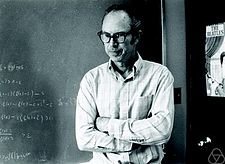Robert R. Phelps
| Robert R. Phelps | |
|---|---|
 |
|
| Born |
March 22, 1926 California |
| Died | January 4, 2013 (aged 86) Washington State |
| Residence | Washington State |
| Nationality | United States |
| Fields | |
| Institutions | University of Washington |
| Alma mater | University of Washington |
| Doctoral advisor | Victor L. Klee |
| Doctoral students |
|
| Known for | |
| Influenced |
|
| Spouse | Elaine Phelps |
Robert Ralph Phelps (March 22, 1926 – January 4, 2013) was an American mathematician who was known for his contributions to analysis, particularly to functional analysis and measure theory. He was a professor of mathematics at the University of Washington from 1962 until his death.
Phelps wrote his dissertation on subreflexive Banach spaces under the supervision of Victor Klee in 1958 at the University of Washington. Phelps was appointed to a position at Washington in 1962.
In 2012 he became a fellow of the American Mathematical Society.
He was a convinced atheist.
With Errett Bishop, Phelps proved the Bishop–Phelps theorem, one of the most important results in functional analysis, with applications to operator theory, to harmonic analysis, to Choquet theory, and to variational analysis. In one field of its application, optimization theory, Ivar Ekeland began his survey of variational principles with this tribute:
The central result. The grandfather of it all is the celebrated 1961 theorem of Bishop and Phelps ... that the set of continuous linear functionals on a Banach space E which attain their maximum on a prescribed closed convex bounded subset X⊂E is norm-dense in E*. The crux of the proof lies in introducing a certain convex cone in E, associating with it a partial ordering, and applying to the latter a transfinite induction argument (Zorn's lemma).
Phelps has written several advanced monographs, which have been republished. His 1966 Lectures on Choquet theory was the first book to explain the theory of integral representations. In these "instant classic" lectures, which were translated into Russian and other languages, and in his original research, Phelps helped to lead the development of Choquet theory and its applications, including probability, harmonic analysis, and approximation theory. A revised and expanded version of his Lectures on Choquet theory was republished as Phelps (2002).
...
Wikipedia
